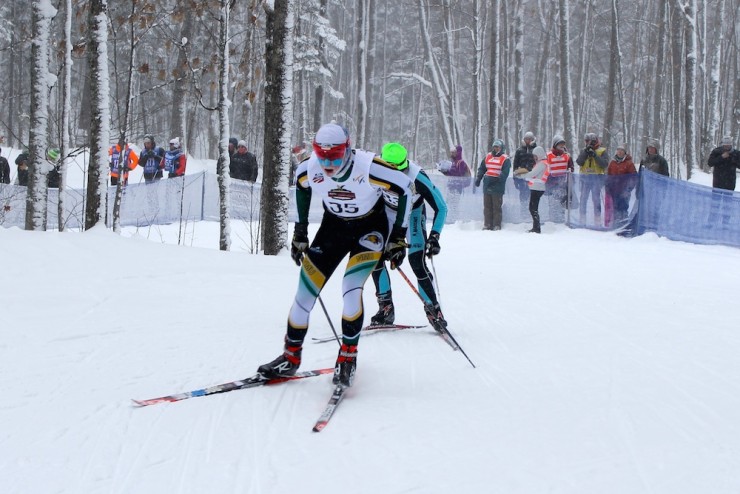
When Kyle Bratrud woke up Sunday morning, he thought, great — a couple inches of fresh snow, temperatures hovering around the single digits — perfect.
The 21-year-old Northern Michigan University (NMU) senior was actually serious when he talked about reveling in the conditions after the men’s 15-kilometer freestyle individual start, which kicked off a blustery and snowy first day of U.S. Cross Country Championships.
“As a smaller guy, the slower the better for me,” Bratrud said.
And the longer the race, like twice around a new 7.5 k loop at the Michigan Tech Trails, the better, he added. “I’m a pretty endurance-based guy,” he said.
Three weeks ago, Bratrud placed third in a 15 k classic mass start and fourth in a classic sprint, both Central Collegiate Ski Association (CCSA) races held on the same courses in Houghton. NMU is 100 miles southeast in Marquette, Mich.
Sunday marked his first time skating Michigan Tech’s new 7.5 k course, at least in a race, yet he already knew it well. And when he burst out of the start in bib 35 of 197 men, he quickly found he was the race leader through every point he received splits.
“I never actually got a number [for time ahead], but just to get the first split, to hear that I was the race leader, it felt like a Central race,” he recalled. “I get leader splits a decent amount there so to get it here was something else. I definitely wasn’t expecting that.”
With just five other A-seeded skiers behind him, Bratrud realized he was beating top contenders like Kris Freeman (Team Freebird) and Matt Gelso, of the Sun Valley Ski Education Foundation (SVSEF) Gold Team, who started before him.
By the end of the first lap, he had a 27-second lead over Freeman in second. One of Bratrud’s friends and summer training partners at Alaska Pacific University (APU) in Anchorage, Logan Hanneman of ranked third through 7.5 k, another 4.2 seconds after Freeman.
Bratrud said he never knew exactly how much he was leading by, but he did know that if he kept it up, he was on his way to his first national title and his best national finish by 23 places.
With U23 World Championships on his mind in his last year of eligibility (Bratrud turns 22 on Feb. 9th), the Minnesota native held his own and won the 15 k in 42:01.6, exactly 50 seconds ahead of Freeman, who started three minutes ahead of him.
“I was just excited the whole way; I’ve never been in the top 20 at U.S. nationals so that was a little bit an improvement,” he said with a laugh.
Last year at the U.S. championships in Midway, Utah, Bratrud posted a best result of 24th in the classic sprint. He was 29th in the 15 k classic and 48th in the 30 k freestyle mass start. Two seasons ago, he made it to the 2013 Junior World Championships in Liberec, Czech Republic.
“Last year [nationals] was at altitude and I don’t ski very well at altitude, so I didn’t feel like my results there were very indicative of where I should be,” he said. “I’ve had some good results at NCAA’s [Championships] and I knew at least a top 10 was possible, that was my goal, so to win was something else.”
His goal had been to peak at nationals, less than 1,000 feet above sea level in Houghton. With a win, he put himself in a prime spot to be nominated to the U23 World Championships team, which will be announced after the final national race next Saturday.
“To make U23s, you’ve got to race well at nationals,” he said. “I’ve been skating well all year so the 15 k was kind of my goal and I’m really excited for the 30 k as well, but it’s sweet to start the week with a win.”
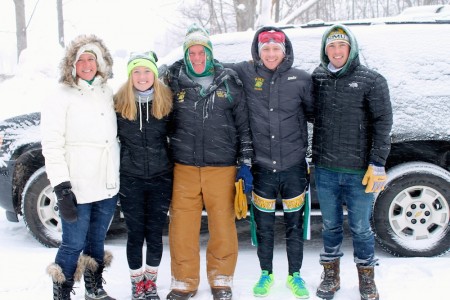
His family was also there to watch him do so, including his mom, dad, sister and brother. Bratrud said he was happy to ski well in front of them, as well as several Midwest (and non-Midwest) friends and parents.
“Being from Northern Michigan, we ski here almost every weekend … so I knew the course really well and I knew where I could push myself and where I need to take it a bit easy,” he explained, emphasizing he attacked the long, gradual uphills as opposed to the steepest terrain. “It just felt like another Central Region race for me, just a few more people, but it was really good.”
Bratrud led two NMU skiers in the top five with sophomore Fredrik Schwencke in fifth, 1:11.6 back. In his second season at NMU (after coming to the university from Norway with assistant coach Haakon Baanerud last year), Schwencke also knew the Michigan Tech Trails well.
On Dec. 21, he won the CCSA 15 k classic race, edging Bratrud in third by 1.1 seconds.
“We know this course very well, we’ve raced here a lot and we know we have a good team,” Schwencke, 22, said after Sunday’s race while standing near his dad, who was visiting from Oslo, Norway, with his mom and brother.
While he was pleased to race well in front of his family, in Michigan for a week and a half and leaving before Thursday’s 30 k classic mass start, Schwencke thanked NMU head coach Sten Fjeldheim, the 2014 national collegiate coach of the year.
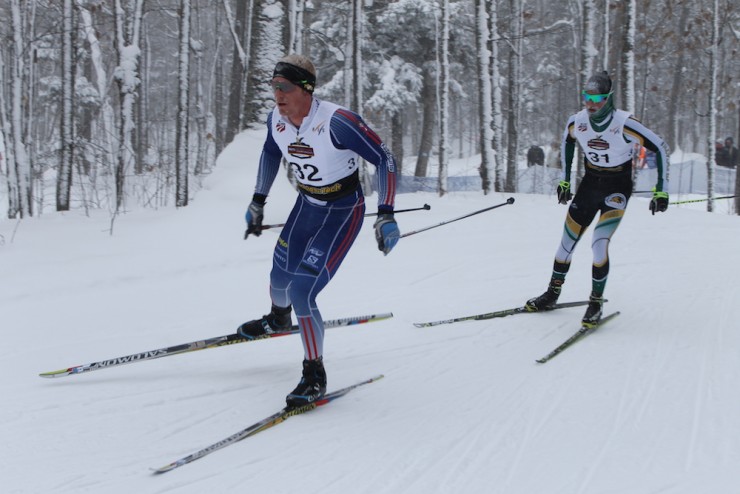
“I was hoping for great skis and we had really great skis today,” Schwencke said. “I think our team benefits from slow conditions. We’re not that fast of skiers so we do well when it’s slow.
“It’s been two exciting years,” he added. “Today was a really good day. I feel much better in classic so it was kind of a surprise doing that well in skate so I’m really excited for the next couple races.”
Also for NMU, Adam Martin placed 13th and Ian Torchia was the top junior in 16th.
Fjeldheim called the men’s team’s performance “solid” and a direct result of an entire season of training. He was also proud that they’re all full-time students who trained 85 to 92 hours a month from September through November.
“Our guys have been super positive and they have been a really fun group to coach,” he said. “They have been working together really, really well. Not just our top four guys, but our whole men’s team; we have seven guys. We have some young enthusiasm in the team .. and right now, it is just good energy and solid training, you know, there is no secret.
As for Bratrud, Fjeldheim referred to him as a straight-A student with a “hell of a motor.”
“He has really made a huge commitment to this sport,” he explained. “We work a lot on balancing the athletes’ life between academics and athletics and I think that is what has really helped him. He has kept a really good perspective and I know and Kyle knows now that developing to be a good skier takes anywhere from five to ten years.”
Now that Bratrud has almost four years of collegiate-skiing experience, Fjeldheim said in another six, he could be “one of the best skiers we have had in a long time. He has just a really, really solid attitude.”
Freeman Second, Caldwell Captures Third
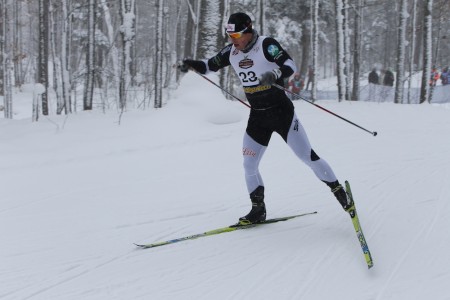
Freeman in second was surprised to see Bratrud at the top of the results list, but said that’s what nationals is all about.
“He wasn’t really on my radar, but I guess that’s what nationals is for — for people to come out of the woodwork,” the 34-year-old,16-time national champion said.
After a slower start than he would’ve liked, the four-time Olympian rallied to post the fastest splits through 23 starters.
“I was surprised I was behind in the splits early and I just fought as hard as I could,” Freeman said. “[In] the initial couple kilometers, I was twenty seconds down which was not normal and I didn’t go out easy, either, so I’m not sure what was going on there.”
He tried to latch onto Scott Patterson (APU), who started 15 seconds ahead of him, and closed on him in the first kilometer, but Patterson began to pull away on the initial long climb back up.
“I was getting pretty discouraged until we got to the top of the course and both he and [Sun Valley’s] Miles [Havlick, who started 30 seconds ahead of Freeman] came into view,” he added.
The three skied together and Freeman clawed back the time on Paddy Caldwell (Dartmouth College/Stratton Mountain School T2/U.S. Ski Team) and Gelso, who started behind him.
“I guess it was OK,” Freeman said of his result. “I was second to Kyle, who had a hell of a day so, what can you do?”
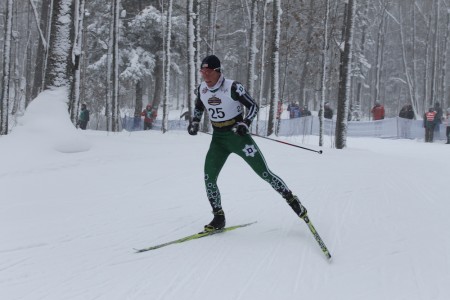
The eventual third-place finisher, Caldwell was fifth fastest at the halfway point, 0.7 seconds behind Gelso in fourth, 1.1 behind Hanneman, and 5.3 back from Freeman — whom he started 30 seconds after.
“I was hearing five to twenty [seconds] behind Kris most of the time,” Caldwell recalled. “I saw him only once in the beginning of the race and then I was just hearing that I was some distance behind, but that’s all I heard.”
The 20 year old ended up third overall for his first senior-nationals podium, 2.7 seconds behind Freeman and one-tenth of a second ahead of Gelso in fourth. Last year at nationals in Utah, he was 16th in the 15 k classic for his previous best.
“That was awesome,” Caldwell said of Sunday’s race, after pulling his neck warmer over his eyes for a moment to defrost his eyelids. “It was definitely an intense race: real cold, snowy, a lot of people out there, which is really fun, but … tough. But it’s awesome doing a 7.5 k loop. I don’t know if I’ve ever done that, that was pretty fun.”
At his last race at the Eastern Cup in Middlebury, Vt., Caldwell won the 15 k freestyle mass start by a minute and 17 seconds. He explained that he used that event — which was of the same distance and skate format on a similarly hilly course — as a tuneup for nationals.
“I wanted to go as hard as I could that race … because I knew today was going to be a day with a lot of solo skiing, which it was” he said. “I skied by myself about the entire time [today] so I really wanted to test that out a couple weekends ago.”
Gelso started 1:45 behind Caldwell and nearly matched his time, but fell 0.1 seconds short.
“I am slightly disappointed in that. I was hoping to be a little higher,” Gelso said of fourth place.
After starting 15 seconds behind Schwencke, he caught up to the Norwegian within the first two kilometers and the two stayed together for much of the race. Schwencke called sticking with Gelso his “main task.”
“It was kind of nice … he caught up with me, I just tried to hang on,” he said. “He gapped me a bit at the very end, but … I benefited from that.”
Gelso topped Schwencke by 18.8 seconds at the finish. He spent the holidays at his home in Truckee, Calif., training at some 6,000 meters above sea level.
“Coming from altitude, I just wanted to go out hard because I would have the benefit of being able to recover quick,” Gelso reflected. “So go out hard and keep it rolling.”
At points throughout the race, he heard he was in second or third. At 7.5 k, his time ranked fourth, 0.4 seconds behind Hanneman.
“I knew it was super tight,” he said.
Rogan Brown of the University of Vermont placed sixth, 1:19.4 behind Bratrud, David Norris (APU) was seventh (+1:26.2), Matt Liebsch (XC United/Gear West) eighth (+1:27.3), Lex Treinen (APU) ninth (+1:45.6), and Patterson 10th (+1:49.7).
Hanneman ended up 11th (+1:53.9), and Havlick was 12th (+2:02.5).
One of APU’s World Cup skiers, Reese Hanneman was listed to start but did not race. According to APU Head Coach Erik Flora, he had been planning to race three out of four events at nationals.
“Going through Period 1 [on the World Cup] is a good stress and a good experience, and coming here, we are looking at the sprint races and the 30 k,” Flora said. “We thought focusing on the three out of the four was going to be a good way and that was going to give him an extra day of prep as well.”
During the women’s 10 k on Sunday afternoon, the sprint race was rescheduled from Monday to Tuesday because of forecast sub-zero temperatures and high winds. Flora said if they’d known about the switch beforehand, Reese Hanneman might have done the 15 k with an extra day of rest before the sprint.
Former U.S. Ski Team member Tad Elliott, of the Ski & Snowboard Club Vail Elite Team, was also missing from Sunday’s race as he recovered from “some sort of flu/cold” in Durango, Colo., he explained in an email.
“Then [I] coughed so hard I injured my back!” Elliott wrote. “I am on the mend and hope to show up later in the week to race. I am still in Colorado getting mom’s love and soup and broth!”
— Lander Karath contributed reporting
Alex Kochon
Alex Kochon (alexkochon@gmail.com) is a former FasterSkier editor and roving reporter who never really lost touch with the nordic scene. A freelance writer, editor, and outdoor-loving mom of two, she lives in northeastern New York and enjoys adventuring in the Adirondacks. She shares her passion for sports and recreation as the co-founder of "Ride On! Mountain Bike Trail Guide" and a sales and content contributor at Curated.com. When she's not skiing or chasing her kids around, Alex assists authors as a production and marketing coordinator for iPub Global Connection.



